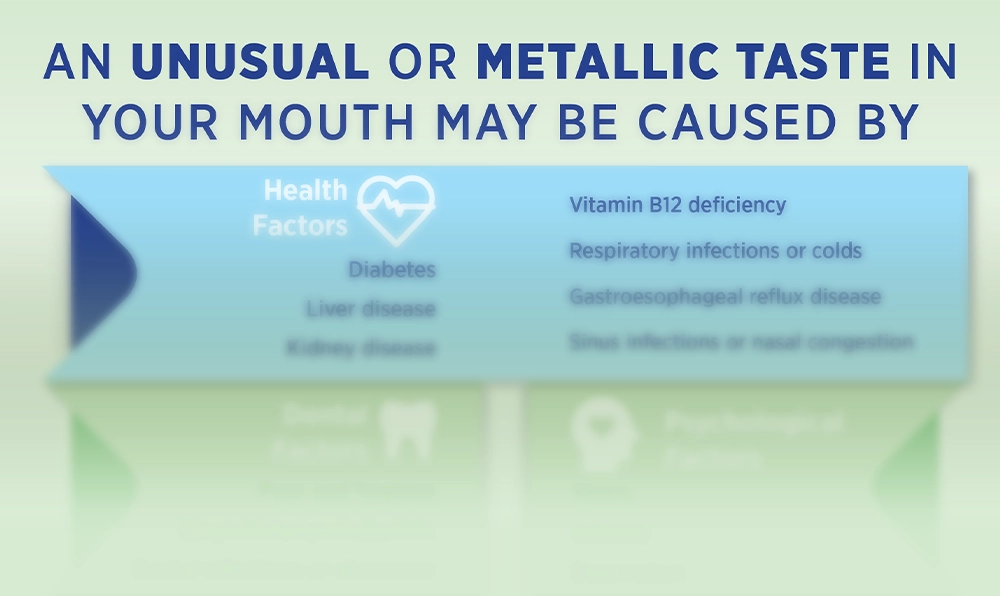
That stubborn metallic taste that won’t go away – ugh, right? If you’ve dealt with it, you know how annoying it can be. And trying to get doctors to take it seriously? Don’t even get me started.
Let’s talk about this. We reached out to some real people to get their unfiltered stories about living with metallic taste. The diagnosis process, the impact on their lives, how they cope, treatment frustrations…they shared it all.
Grab a snack, settle in, and get ready to commiserate with fellow metallic taste warriors.
Getting properly diagnosed? Way harder than it should be. Rachel’s been dealing with metal mouth for years. She said, “Doctors kept brushing it off as anxiety or meds side effects. I saw so many specialists before one finally figured out I have zinc deficiency.”
Max can relate. He told me, “Oh man, I went through allergy meds, mouthwashes, the works. Total runaround. An ENT doctor finally connected the dots that my taste buds are jacked up.”
The consensus? Doctors need way more education on metallic taste causes. Without a diagnosis, it’s like having a mystery illness no one understands. Super frustrating.
So what happens when everything tastes like a mouthful of pennies? The joy of eating takes a nosedive. Lucy gave me the scoop: “My appetite’s tanked big time. When food is metallic, it’s not appetizing. I’ve lost weight because eating feels like a chore now.”
Going out to eat gets awkward too. Chris hates it: “I know the food won’t taste right. It’s embarrassing sending plates back or leaving food uneaten. Super annoying for me and my dining companions.”
Eva summed it up: “Eating used to be my favorite hobby. Now it just bums me out. I don’t get that happy food rush anymore.”
Masking metallic means getting creative. James takes a flavor overload approach: “I douse everything in spices and lemon juice. Helps overpower the metal taste.”
Rachel opts for citrus: “I suck on lemon drops all day. The tartness beats the metal.”
And Max goes for strong flavors: “Garlic, chili, vinegar – anything intense that can break through the metal.”
Trying new tricks to make food tolerable again becomes the name of the game. It takes some patience though.
Oh, and some people find swishing Metaqil oral rinse before eating helps tone down the metal taste for a few hours. More on that later!
Here’s the kicker – even figuring out the root cause and treating it doesn’t always work instantly. Bummer, right?
Eva started taking zinc for her deficiency. But she told me, “My metal mouth didn’t magically disappear. My doctor said it could take months for taste buds to heal.”
James got surgery to fix his sinus issues. He was pumped it would end his metal mouth. A year later though, the metallic taste remains.
Moral of the story? Patience and realistic expectations are key. Metal mouth is stubborn.
Check Out: Living With Parageusia
Okay, back to Metaqil. This oral rinse was designed to temporarily reduce metallic taste. And for some, it really helps make eating less torture.
Chris said his doc suggested Metaqil, and it was a game changer: “Swishing before meals significantly dials down the metal taste for me.”
Eva uses it twice a day: “Metaqil gives me a good 3-4 hours of lessened metal mouth. Makes eating more bearable.”
Look, it’s not a cure-all. But when you’re desperate for a meal that doesn’t taste like pennies, Metaqil can offer some welcomed relief.
If you’re struggling with metallic taste, know you aren’t alone. Connecting with others dealing with it can help.
Chris wants to raise awareness: “Knowing I’m not alone in this fight makes me feel better. We need to get the word out on metal mouth.”
And Max is hopeful for the future: “I think better treatments are coming. For now, we cope the best we can. But solutions are on the horizon.”
Soon the medical world will catch up. But in the meantime, we have each other’s stories. Maybe you’ll even discover a new coping strategy or form of relief. Hang in there, metallic taste warriors!
